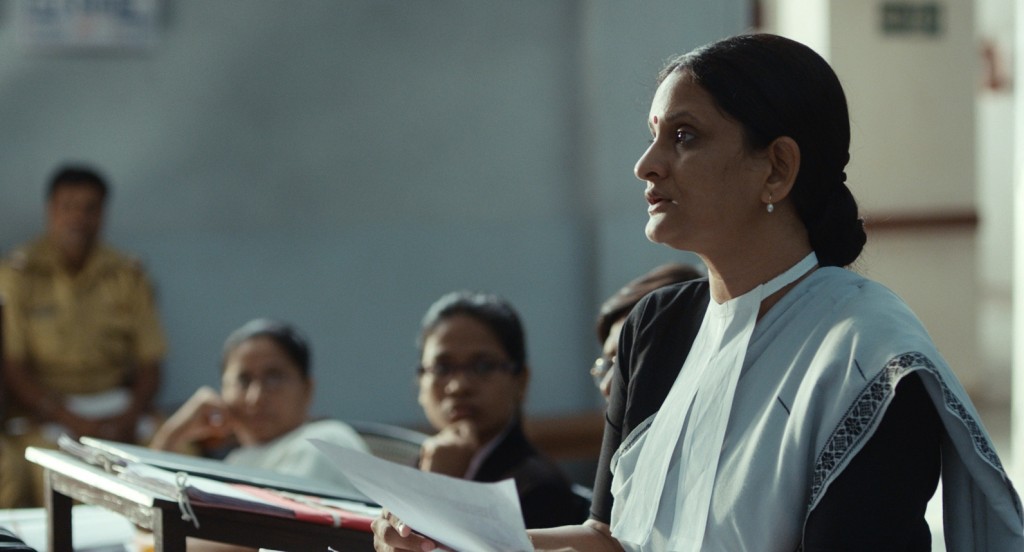The unfolding trial of a Dalit Folk Singer cum Activist (Vira Sathidar), charged with abetting the suicide of a sewer worker in Mumbai, castigates the functioning of the Indian legal system.
Court is one of the finest films to come out of India in recent times and marks a great debut for director Chaitanya Tamhane, The film works on many levels and not only does it critique the Indian judicial process and its running but by showing us the lives of those who represent it outside of the court, lets us try to understand their way of thinking. The film deserves all the accolades and awards it has won the world over including winning Best Film at the recently announced National Awards.
Tamhane gives us a real world with real people. Rarely has the functioning of a courtroom been shown with such authenticity and with such attention to detail. The lawyers are not the most articulate, at times struggle to read off the sheets of paper, the overall procedure is dull as hell with no sense of urgency at all, yet there are moments of wry humor and even absurdity as we see cases adjourned for the stupidest of excuses justified by as going by the rules – one case is not heard becauses the defendant has won a sleeveless blouse! In that sense, the film makes a strong point not just on the so many archaic laws still in existence, but also on how they are used and interpreted and as we see in the main case, to what extent the entire system can go to ensure politically motivated injustice against the lower castes and have nots.
The script keeps a delicate balance between the actual case hearings, snippets from other hearings held before or after it, and the lives of those involved, outside the court. The treatment is one of a more observant nature rather than delving deep into issues and yet it works really well for the film. The characters are subtly yet neatly fleshed out especially when we see them in the environment outside the case.
If there is a quibble with the film, I’m not sure the coda at the end works effectively, especially when Tamhane already had a killer of an ending before it. The film also does occasionally ply to stereotypes in the sense that the case with the sleeveless blouse (as I would call it!) concerns a Christian woman dressed as the court finds inappropriate.
The casting is spot on and the acting is by and large as natural and real as rest of the film. Sathidar, in particular, is amazing as the stubborn activist. In a sense playing himself (he is a singer-writer-activist in real life), he nevertheless shines as an actor, literally coming alive in the two song sequences, where he performs with gusto. Geetanjali Kulkarni as the prejudiced prosecution lawyer otherwise devoted to her family, producer Vivek Gomber as the defense lawyer with his parents on his case all the time, and Pradeep Joshi as the sharp-but-by-the-rules judge presiding over the case, all leave their mark. The supporting cast too is flawless with a good turn by Usha Bane as the dead sewer worker’s wife.
The technicalities are in a way minimalist but highly effective. The camerawork (Mrinal Desai) is largely still but the frames are telling and the copious use of long shots – in both magnification and duration – goes with the gentle storytelling. In fact, this is the most unobtrusive camerawork I have seen in an Indian film in a while and the detailing of action within the wide and static frames is commendable. The editing successfully maintains the pace and rhythm of the film, which keeps cuts within scenes to a minimum (some scenes are single shots) but there are times you do feel the scenes are being stretched on needlessly. The sound design often speaks volumes with its silences while the production design (Pooja Talreja, Somnath Pal) deserves a special mention for both, the depiction of the sessions court and the magistrate court. The research done in this regard is immaculate and one has to hand it to the film for its convincing use of real locales as well.
Overall, it’s films like Court that reaffirm one’s faith that Indian cinema does actually have the scope to make a serious mark worldwide. Now, one hopes and prays this also opens the door further for more better films to be made in the country.
Marathi, Gujarati, Hindi, English, Drama, Color


